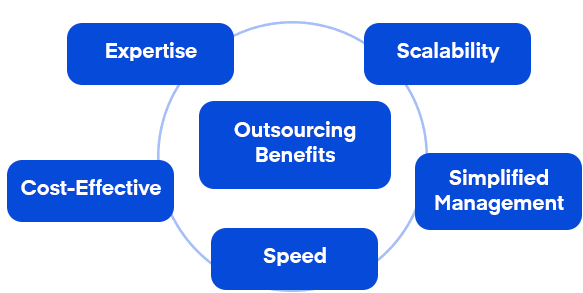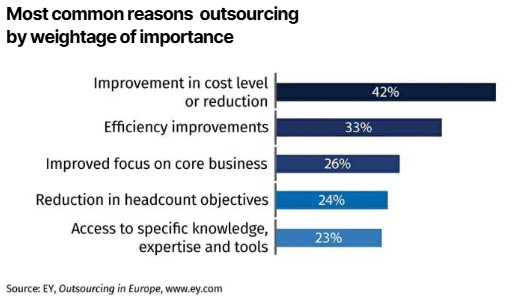Silicon Valley stands as the global epicenter of technological innovation, a hub where groundbreaking ideas are born and disruptive technologies are developed. The region's unique ecosystem, characterized by a concentration of venture capital, a culture of entrepreneurship, and a relentless pursuit of innovation, creates both opportunities and challenges for tech companies. In this highly competitive environment, Silicon Valley firms are increasingly turning to outsourcing to gain a competitive edge. Outsourcing allows them to access specialized skills, reduce costs, and accelerate time-to-market. This trend is driven by the need to stay ahead of the curve and adapt to rapidly changing market demands. We will delve into the drivers, use cases, and strategic considerations that make outsourcing a valuable tool for tech companies in this dynamic region.
The Drivers of Outsourcing in Silicon Valley
Silicon Valley faces a persistent talent shortage, particularly in specialized areas such as AI, cybersecurity, and advanced software development. The demand for highly skilled engineers and developers often outstrips the local supply, making it challenging for companies to fill critical roles. Outsourcing provides access to a global talent pool, enabling firms to tap into specialized skills that may not be readily available locally.
Cost Optimization and Resource Allocation
While Silicon Valley is known for its innovation, it is also one of the most expensive places to operate a business. Outsourcing allows companies to reduce operational costs by leveraging the lower labor costs of other regions. This enables them to allocate resources more effectively, focusing on core innovation and strategic initiatives.
Need for Rapid Scalability and Agility
Silicon Valley firms operate in a fast-paced environment where speed and agility are essential. Outsourcing provides the flexibility to scale operations quickly, allowing companies to respond to changing market demands and capitalize on emerging opportunities. This is particularly important for startups and rapidly growing companies.
Focus on Core Innovation
By outsourcing non-core functions, such as IT infrastructure, customer support, and QA testing, Silicon Valley firms can free up internal resources to focus on core innovation and product development. This allows them to maintain a competitive edge and drive long-term growth.
Key Outsourcing Use Cases for Silicon Valley Firms
- Software Development and Engineering
Software development is a core function for many Silicon Valley firms. Outsourcing software development allows companies to access specialized engineering talent, accelerate development cycles, and reduce costs. This includes front-end and back-end development, mobile app development, and cloud-based solutions.
- Product Development and Prototyping
Outsourcing product development and prototyping enables companies to rapidly test and validate new ideas. This includes hardware prototyping, software prototyping, and user testing. Outsourcing allows for faster iterations and reduced time-to-market.
- IT Infrastructure and Cybersecurity
Maintaining a robust and secure IT infrastructure is crucial for Silicon Valley firms. Outsourcing IT infrastructure and cybersecurity services provides access to specialized expertise and advanced security tools. This includes cloud computing, network management, and cybersecurity monitoring.
- Data Analytics and AI
Data analytics and AI are increasingly important for driving innovation and decision-making. Outsourcing data analytics and AI development allows companies to leverage specialized skills in machine learning, data mining, and predictive analytics.
- UI/UX Design and Testing
Creating intuitive and user-friendly interfaces is essential for the success of tech products. Outsourcing UI/UX design and testing allows companies to access specialized design talent and ensure a high-quality user experience.
- Customer Support and QA
Customer Support and QA are vital to maintain customer satisfaction and product quality. Outsourcing these roles allows for round the clock support, and specialized testing procedures.

For Silicon Valley firms, accessing global talent is not just about cost savings; it's about acquiring cutting-edge skills that may be scarce or non-existent domestically. Imagine a startup developing AI-driven healthcare solutions. They might outsource specialized machine learning engineers from Eastern Europe or data scientists from India, who possess unique expertise in medical imaging analysis. This global talent pool brings diverse perspectives and innovative approaches, fostering a culture of continuous learning and problem-solving. This also means that companies can find people who are expert in niche areas that are needed for short amounts of time, without having to hire a full time employee.
Outsourcing directly impacts and improves an increased speed to market
In the fast-paced world of Silicon Valley, time is a critical competitive advantage. Outsourcing allows companies to accelerate product development and launch new features or products faster. By leveraging time zone differences, a company can achieve round-the-clock development cycles. For example, a software company can have its US-based team hand off tasks to an offshore team at the end of the US workday, ensuring continuous progress. This rapid development cycle allows companies to quickly validate ideas, iterate on prototypes, and stay ahead of competitors.
Enhanced Flexibility and Scalability
Silicon Valley firms often experience rapid growth and fluctuating demand. Outsourcing provides the flexibility to scale resources up or down as needed, without the overhead of hiring and firing employees. This agility allows companies to adapt to changing market conditions and capitalize on emerging opportunities. For instance, a cloud-based platform might outsource customer support during peak usage periods to handle increased inquiries without straining internal resources. This flexibility is crucial for startups that need to manage resources efficiently while navigating uncertain growth trajectories.
Cost-Effective Innovation
Outsourcing allows Silicon Valley firms to achieve innovation at a lower cost. By leveraging the lower labor costs of other regions, companies can allocate more resources to R&D, product development, and marketing. This cost-effective approach enables companies to experiment with new technologies, develop innovative solutions, and stay competitive without breaking the bank. For example, outsourcing QA testing to a region with lower labor costs can free up budget for investing in cutting-edge AI research.


Strategic Considerations for Successful Outsourcing
The talent shortage in Silicon Valley poses a significant risk to tech companies. Outsourcing helps mitigate this risk by providing access to a diverse pool of talent. Additionally, outsourcing can help mitigate the risk of relying on a single geographic location for talent, which can be vulnerable to local market fluctuations. For instance, a company might outsource cybersecurity monitoring to a team in a different country to ensure 24/7 protection against cyber threats, regardless of local disruptions.
Partner Selection and Due Diligence
Selecting the right outsourcing partner is crucial for the success of any outsourcing initiative. Beyond technical expertise, US business owners should prioritize partners with strong communication skills, cultural compatibility, and a proven track record of delivering high-quality work. Due diligence should include reviewing client testimonials, assessing security protocols, and evaluating the partner's ability to scale resources. It is also important to request a detailed portfolio, and to interview team members who will be working on your project.
Communication and Collaboration Strategies
Effective communication is the cornerstone of successful outsourcing. US business owners should establish clear communication protocols, utilize project management tools, and schedule regular check-ins with their remote teams. Video conferencing, instant messaging, and collaborative document sharing platforms are essential for maintaining seamless communication. Consider implementing agile methodologies, such as daily stand-ups and sprint reviews, to ensure alignment and track progress.
Data Security and IP Protection
Protecting sensitive data and intellectual property is paramount. US business owners should ensure that their outsourcing partners have robust security measures in place, including data encryption, access controls, and compliance with relevant regulations. Legal agreements, such as non-disclosure agreements (NDAs) and intellectual property transfer agreements, should be established to safeguard proprietary information. Regular security audits and vulnerability assessments should be conducted to identify and address potential risks.
Agile Outsourcing and Project Management
Agile methodologies are well-suited for outsourcing projects, particularly in software development. US business owners should adopt agile practices, such as iterative development, continuous integration, and frequent feedback loops. This allows for greater flexibility, faster iterations, and improved collaboration. Project management tools, such as Jira or Trello, can help track progress, manage tasks, and ensure alignment with project goals.
SLA’s and KPI’s
Service level agreements (SLAs) and key performance indicators (KPIs) are essential for defining expectations and measuring performance. US business owners should establish clear SLAs that outline service deliverables, response times, and quality standards. KPIs should be defined to track progress against project goals and ensure alignment with business objectives. Regular performance reviews and feedback sessions should be conducted to monitor performance and address any issues.
The future of outsourcing in Silicon Valley will be shaped by emerging trends and technologies, such as AI, automation, and cloud computing. AI-powered automation will streamline outsourcing processes, enhance efficiency, and reduce costs. Cloud computing will enable seamless collaboration and data sharing between remote teams. US businesses will see more use of hyper specialization and niche outsourcing as well. With the rise of remote work and distributed teams will further accelerate the adoption of outsourcing in Silicon Valley. Companies will increasingly embrace a hybrid work model, combining in-house and remote teams to leverage the benefits of both. This will require strong communication and collaboration tools, as well as robust security measures.
Silicon Valley firms will need to adapt to evolving market demands by embracing agile outsourcing strategies and fostering a culture of continuous learning. This will require strong partnerships with outsourcing providers who can provide access to specialized skills and expertise. The ability to adapt to rapid changes will become even more crucial. Outsourcing provides Silicon Valley firms with a powerful tool to accelerate innovation, reduce costs, and gain a competitive advantage. By leveraging global talent and expertise, companies can overcome talent shortages, enhance flexibility, and focus on core innovation. Strategic considerations, such as partner selection, communication, and data security, are essential for successful outsourcing initiatives.
